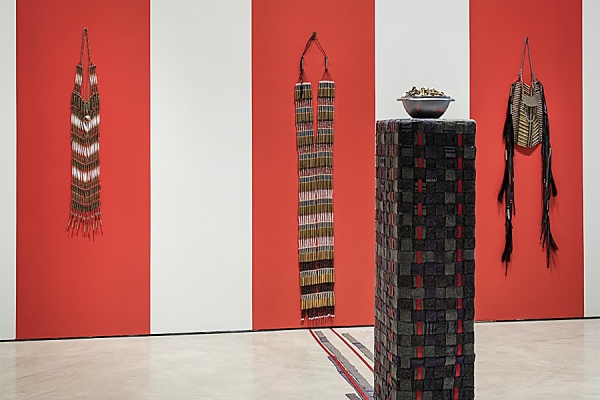 “They Tried to Bury Us, They Didn't Know We Were Seeds” by Three Collective, displayed at the Art Gallery of Windsor.
“They Tried to Bury Us, They Didn't Know We Were Seeds” by Three Collective, displayed at the Art Gallery of Windsor.
A trio of Indigenous artists will discuss their work during the opening day of the UWill Discover conference, Tuesday, March 29.
The three — all alumni of the School of Creative Arts — have been working collaboratively for the last couple of years under the name Three Collective. Each has established an individual practice, working in a range of mediums and creative industries.
Jessica Rachel Cook (BFA 2006, B.Ed 2006) Is Oji-Cree, her family coming from Constance Lake First Nation and Bkejwanong First Nation and is from the Wolf Clan. Cook works with traditional and contemporary media, including photography, painting, sculptural installation, and even beyond the studio into other creative industries. She is a producer and production designer and has created promotional and marketing materials for online, print, film, and television. Cook is also an educator, and her experience in various modes of teaching leads her to pursue projects working collaboratively with local communities to create group art projects.
Boyd Harris (BFA 2006, B.Ed 2006) is from the Six Nations reserve; he is of the Seneca Nation, from the Wolf Clan. Harris’ work reflects his cultural heritage through multimedia projects and photography. Looking at the continuing effects of colonization, his work tells the story of the strength and resilience of First Nations People. He has also consulted with organizations like the Woodland Cultural Centre in Brantford to select works by Indigenous artists for the permanent collection.
Julie Rae Tucker (MFA 2006) is a Windsor-based artist, independent curator, and cultural worker. She is Lunaapeewi from the Munsee Delaware First Nation and settler descent. She has both been exhibited and curated exhibitions across Canada and in Scotland. Her recent project, the Legacy of Residential Schools, was available on VUCAVU.
They first came together in a casual way, meeting to share their experiences as artists. Through those conversations, they began to build ideas, and eventually, during the early days of the pandemic, the conversations turned to how they might work together.
Their first work to be exhibited was They Tried to Bury Us, They Didn't Know We Were Seeds, in the Art Gallery of Windsor’s Triennial group exhibition which closed this past January. A striking installation weaving strips of a wool blanket and red ribbon like a basket to cover a plinth atop which sits an aluminum bowl filled with bullet shells, the piece incorporates three protective breastplates set against three red stripes painted floor to ceiling on the wall.
Their new work NDN New Year was installed at Dry Goods Gallery, a window gallery space run by Nicole Baillargeon in Ford City.
The collective describes the project as “7912+ lengths of orange material that represent and acknowledge the unmarked graves of children who have been found on the grounds of residential schools in the U.S. and Canada. It will remain a painful reminder of our relations who attended these institutions.”
They are using the occasion to raise support for the restoration of the former Mohawk Institute Residential School and to develop the building into an interpreted historic site and educational resource. Learn more and donate to the project.
The UWill Discover conference will run both online and in person, March 29 to April 1, showcasing student research in a variety of disciplines. The Three Collective session begins at 11 a.m. Tuesday, moderated by Nadja Pelkey of the School of Creative Arts. Find the full conference schedule and register here.
